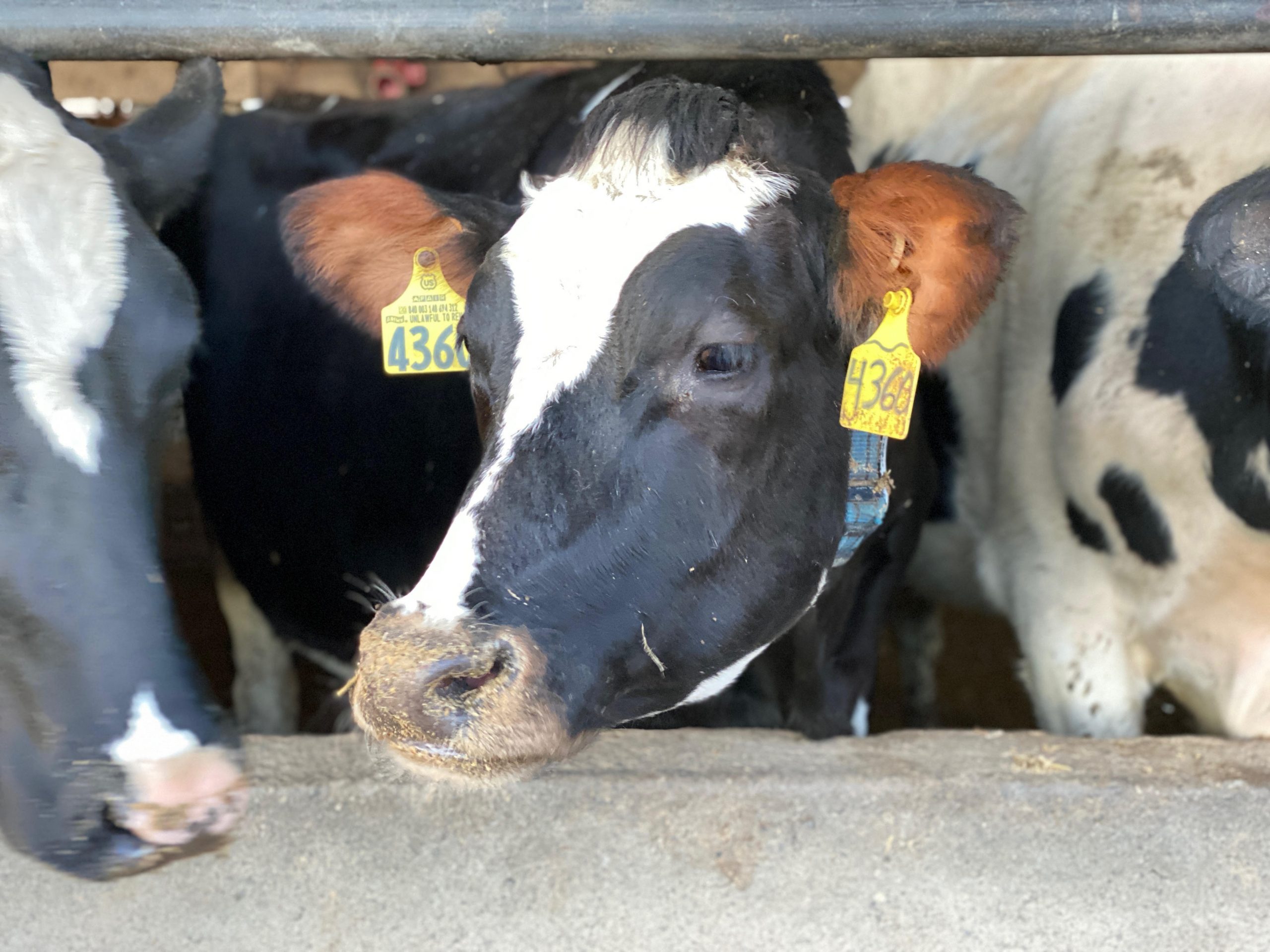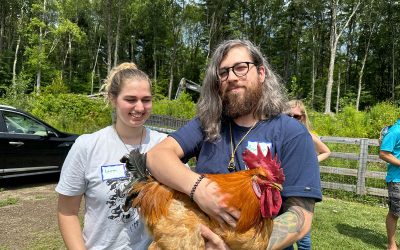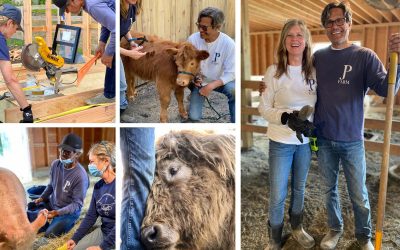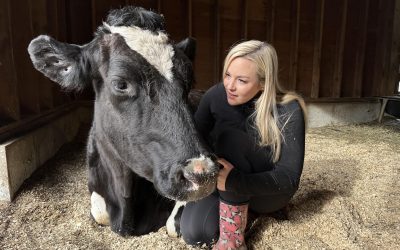Did you know that our Earth Day tradition started in 1970 in a time without a Clean Air or Clean Water Act? The demonstration by twenty million Americans brought attention to the issue, and by December of that year the Environmental Protection Agency was born.

Allie & Copper are often together
Our current Earth Day challenges: As we are learning, the animal agriculture industry has a significant impact on climate change and global warming. According to the United Nations, the livestock sector contributes about 14.5% of global greenhouse gas emissions, with beef and dairy production being the most significant contributors. This industry along with production of animal materials also uses a large amount of water, land, and other resources, which has further environmental implications such as the deforestation of the Amazon and all of its biodiversity.
The production and transportation of animal feed, the disposal of animal waste, and the use of fertilizers and pesticides for animal feed production also contribute to environmental degradation (thus the emission percentage is much higher, when combined).

Copper, at the dairy farm, before she came to JP
3 Facts regarding the connection between Animal Agriculture and Climate Change
- 77% of the agricultural land on the planet is directly used for raising animals, while 23% is used for raising crops. Since half the crops are fed to animals, animal agriculture accounts for 86% of the agricultural land area of the planet.(1)
- 7% of the ice-free land area of the planet provides 85% of the food we eat in the form of plant foods. Animal agriculture takes up 43% of the ice-free land area of the planet, while providing just 12% of the food we eat in the form of meat, dairy and eggs. The seafood we eat constitute the remaining 3%, for which we have been destroying the entire ocean. (2)
- Each and every day, the methane that is emitted from animal agriculture causes more incremental planetary heating than the CO2 emitted from all fossil fuel sources combined. (3)
Suggested solutions:
To address this issue, we can take positive actions, such as reducing our consumption and or purchasing of any animal products, supporting plant-based agriculture, and promoting sustainable plant-based lifestyles. Switching to a plant-based diet or reducing animal product consumption can significantly reduce greenhouse gas emissions and conserve resources. *** Please note that different organizations’ measuring metrics vary thus the percentages quoted may not equate but all of their concern and emphasis on animal agriculture effects are similar.
Making connections:
One way to make a compassionate connection with animals while supporting these positive actions is by visiting a farm animal sanctuary, such as JP Farm Animal Sanctuary. At sanctuaries, visitors can interact with animals who have been rescued from the animal agriculture industry and witness the positive impact of providing them with a safe and loving home, experiencing that they are sentient beings who want to live just like us. Sanctuaries also often promote plant-based lifestyles, shopping local, highlighting non-animal products and overall education about animal agriculture and its impact on animal welfare, our health, and the environment.

Delicious plant-based foods. Ask us for recipes!
Together with encouragement:
When we contemplate the condition of our planet, we may feel helpless about our incapacity to effect positive change. Therefore, it is crucial to concentrate on what we have authority over, such as our food choices. By consuming food that aligns with our beliefs and promotes ecological responsibility, we become empowered. These small but significant dietary decisions accumulate over time, and together, we can create a significant impact.
Reach out to us to reserve your visit to JP and let’s continue the conversation. Supporting each other and inspiring compassionate living together makes positive change possible!
With love and care for the health of our earth and all beings,
Britt
References
Food and Agriculture Organization of the United Nations 2013, Tackling climate change through livestock – A global assessment of emissions and mitigation opportunities, FAO, viewed 18 April 2023, http://www.fao.org/3/a-i3437e.pdf.
Steinfeld, H et al. 2006, Livestock’s long shadow: Environmental issues and options, Food and Agriculture Organization of the United Nations.
Lynch, H & Pierrehumbert, R 2019, ‘Climate impacts of cultured meat and beef cattle’, Frontiers in Sustainable Food Systems, vol. 3, p. 5.
- Calculated from the land use breakdown on Page 4 of the UN IPCC Special Report on Climate Change and Land Use, 2019 and the biomass distribution on Page 836 of the UN IPCC AR5 WG3 Chapter 11.
- Calculated from the biomass distribution on Page 836 of the UN IPCC AR5 WG3 Chapter 11.
- Rao, S. K., “Animal Agriculture is the Leading Cause of Climate Change,” Journal of Ecological Society, Vol 32-33, 2021.
Cowspiracy, The Facts, Infographic.
Would you like to be a part of the sanctuary community? Sign up for our newsletter, write to us, share our sanctuary with others, volunteer or make a donation.
Share the goodness, for goodness sake …. 😉
JP Farm Animal Sanctuary is a nonprofit, tax-exempt. 501(c)(3) corporation (EIN 83-1674833)
More Moo! news and other happenings
Stay up-to-date with all the happenings on the farm.
See how our furry friends spend their days and never miss a story.
we love to share the joy
follow us around
Finding Compassion
If you asked me a few years ago if I could ever see myself as a Vegan, I would laugh […]
JP’s 5 Year Anniversary
We want to celebrate our Sanctuary’s 5 year anniversary with you! […]
“Sanctuary Wishes”
A time to reflect on the wishes of those who often go unheard […]
Join our newsletter!





0 Comments